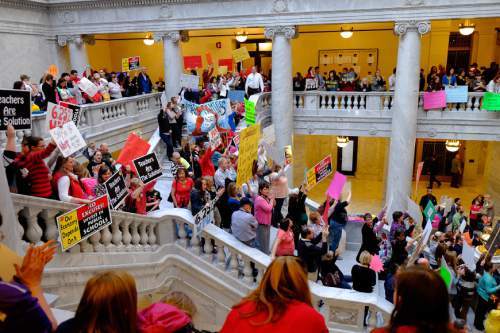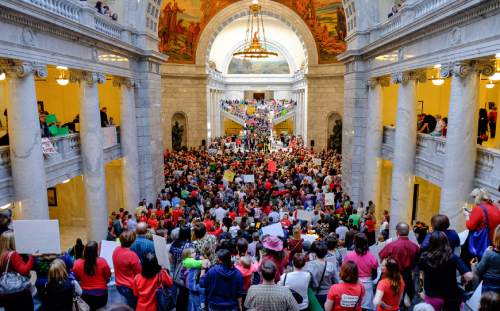This is an archived article that was published on sltrib.com in 2015, and information in the article may be outdated. It is provided only for personal research purposes and may not be reprinted.
As lawmakers put the final touches on this year's education budget Monday, a wall-to-wall crowd of Utah parents and educators gathered in the Capitol Rotunda to push lawmakers for a larger increase in public school funding.
People in the crowd waved signs reading "Teachers are the solution," "Our Kids Deserve It" and "WTF, Where's The Funding?" while loudspeakers blared music by Twisted Sister, AC/DC and the Black Eyed Peas.
They cheered education leaders and Utah Gov. Gary Herbert, whose budget recommendations in December called for a 6.25 percent increase in per-student spending.
And they booed Utah's legislators, who last week released proposed budget numbers that would bump per-pupil funding by 4 percent, or $100 million.
"We need to stop being the silent majority and let the legislators hear our voices," said Liz Zentner, president of the Utah Parent Teacher Association.
Some lawmakers heard the message. Soon after the rally, Rep. Joel Briscoe, D-Salt Lake City, proposed an amendment to increase per-student spending by 5 percent.
The motion failed in a 28-44 vote that included 16 Republicans who joined with the House's 13 Democrats in supporting additional funding for schools.
"I don't know if you stepped outside tonight but there probably were 1,500 teachers here," Holladay Rep. Carol Spackman Moss, a Democrat, told her House colleagues. "They wanted you to hear them and they wanted you to know that this [budget] is significantly lower than they were hoping for.
Rep. Dean Sanpei, R-Provo, opposed Briscoe's amendment. He said lawmakers are required to pass a balanced budget and the 4 percent increase represents a consensus agreement.
"I think we all would like to do more in education," he said.
After Briscoe's motion failed, the House approved the original budget in a 63-10 vote. It will now go before the Senate for consideration.
In addition to a per-student spending increase, the budget included more than $50 million to address enrollment growth and $8 million for a school turnaround bill sponsored by Senate President Wayne Niederhauser, R-Sandy.
Absent from the budget were several priorities of the state school board, including an investment in school technology resources and a partial restoration of teacher training funds that were cut during the Great Recession.
Sen. Howard Stephenson, R-Draper, sponsored this year's technology bill. But on Monday the bill was amended to remove all funding and instead ask the state school board to prepare a technology plan to present to lawmakers.
Kristi Swett, president of the Utah School Board Association, criticized the Utah Legislature for being a "super school board," sponsoring more than 100 education bills each year while failing to adequately support schools and teachers. She described Herbert's budget as historic and told the crowd to "raise the roof" and demand a 6.25 percent increase.
"Who knows better than the people in this rotunda tonight what is best for our kids?" she said.
Concern over legislative meddling was also raised by Utah Education Association President Sharon Gallagher-Fishbaugh, who questioned why lawmakers focus on holding schools accountable while starving teachers of the resources they need to succeed.
"We spend more time trying to figure out how to fire teachers than we do trying to figure out how to support them," she said.
Rally organizers distributed blue and green notecards to the crowd and encouraged attendees to write to their respective senators and representatives.
Gallagher-Fishbaugh said teachers have issued warnings about inadequate funding for years only to watch as classroom sizes ballooned and the state's educational rankings declined.
She said she is often asked why Utah educators perpetually claim to need more money. She compared schools to a person who is starving and said she would not apologize for demanding an investment to give students the education they deserve.
"This is not the UEA asking for more money," she said. "This is the citizenry of this state who are demanding that we stop this track we're on."





